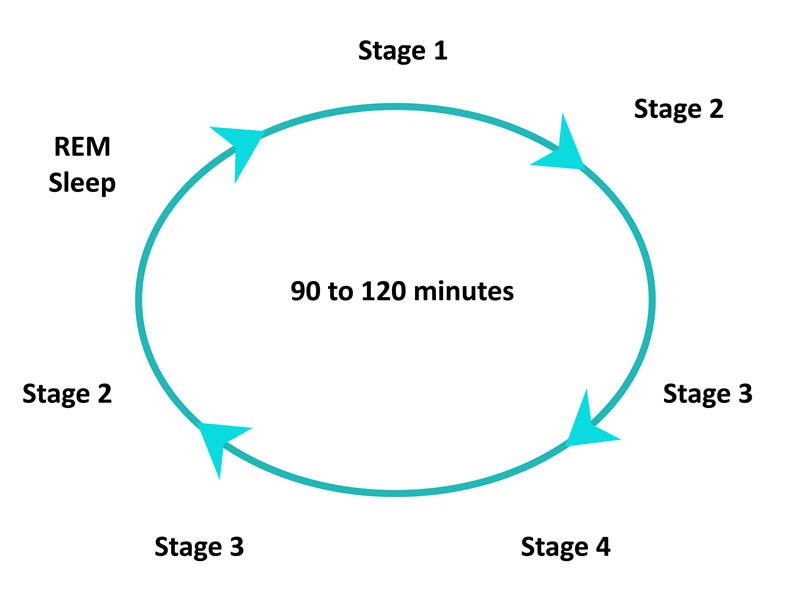Sleep
The function of sleep is for both restoration of energy (allowing the body to recuperate) and conservation (allowing the body to repair).
Difficulty with sleep is a common problem in ME/CFS. Some people find they are sleeping too much, while others find they are not sleeping enough or have problems with getting off to sleep or staying asleep.
There are things that you can do to try and improve your sleep and this in turn will help your overall management of your condition.
Here we will look at a number of strategies, some of which you may find useful. You may also discuss any issues with your sleep with your ME/CFS Therapist.
How much sleep do we need?
This is very variable and there is no ‘ideal’ amount of sleep. Studies have shown that the amount of sleep people need varies from four hours to ten hours a night. It will also be variable depending on your needs at a particular time in your life e.g. a five year old requires approximately 11 hours, a teenager 8-9 hours and someone in their 70’s may only need less than six hours sleep.
Types of sleep/sleep cycle
Stages 1, 2, 3 and 4, or non-REM sleep – The purpose of this stage of sleep is to give the body a chance to relax and recover from the day. This would be considered deep sleep.
Stage 5, or REM sleep – This is a light form of sleep and when we dream. Our brain is most active during this phase of sleep.

The majority of deep sleep occurs in the first four hours of sleep. This therefore means that whether you sleep for four hours or 12 hours you may get roughly the same amount of deep sleep.
It is also important to consider what your sleep pattern was like pre-ME/CFS. This may help when we are thinking about the sleep pattern you are trying to achieve.
For example did you previously wake up early i.e. were a lark or did you always get up later and go to bed late i.e. an owl.
Overcoming sleep problems
1. Sleeping too much
In ME/CFS fatigue and other symptoms are not improved by sleep, so although sleep may have been helpful at the beginning of your illness if you had a viral infection, excessive sleeping may not be making any difference now or may actually make you feel worse.
The consequences of sleeping too much include:
- Increased need for sleep
- The body getting used to excessive sleep and late waking
- Inability to concentrate properly
- Loss of motivation and energy whilst awake
- Reduced enjoyment and satisfaction in life
What can you do about oversleeping?
Complete a sleep diary (on page 10) to work out how much sleep you are getting. If you are sleeping too much try to gradually reduce the amount of sleep by getting up earlier. It is also important to get up at the same time each morning and to go be bed when you feel tired at night. By having a sleep routine you will gain more control over your symptoms.
If possible it is best to avoid daytime sleep as this can again lead to oversleeping or not being able to sleep at night. Also often people feel more tired and ‘groggy’ after daytime napping.
If you find you cannot manage a day without sleeping then do not worry, but if possible try to regulate your sleep to a particular time e.g. 1pm and for a consistent length of time e.g. one hour. Hopefully with time you can then try to gradually reduce the amount of sleeping you are doing during the day.
You could also consider replacing sleep with a good quality rest/relaxation. This will allow your body to recover when fatigued without disrupting your sleep pattern.
2. Not getting enough sleep
Difficulty sleeping is a common symptom of ME/CFS. However, even if you have several bad night's sleep, when you do sleep your body will automatically catch up on deep sleep.
There are several things you can do to manage lack of sleep:
- Get up at a regular time each day – Try not to vary this by more than an hour, even at weekends.
- Have a wind down routine prior to bed. 30 minutes before you go to bed try to do something quiet and non-stressful e.g. have a bath, listen to music. It may also be useful to practice some relaxation.
- Use your bed only for sleeping – It is best to avoid activity such as watching TV, reading or eating in bed as these are all stimulating activities and may therefore interfere with trying to get to sleep.
- Avoid napping during the day. This is because, if you have deep sleep during the day, you will be less tired at bedtime and need less sleep at night.
- Avoid stimulants such as alcohol, coffee, tea, chocolate and cigarettes for four to six hours before bed.
- Have a light bedtime snack such as a glass of warm milk or a banana. These foods contain an amino acid called tryptophan which may help to induce sleep.
- Make sure your bedroom is dark enough.
- Make sure the temperature in your bedroom is comfortable. Being too hot or cold can adversely affect sleep.
- Try to minimise noise in the bedroom.
- Avoid excessive alcohol as it will tend to make you wake more frequently and spend less time in deeper stages of sleep.
- Dealing with anxieties and worries – If possible try to write down problems at night before you go to bed so that you can deal with them in the morning. Try to set some time aside each day to think about any problems you may have and, during this time, try to write down ways that you can resolve these problems.
3. Medication for sleep:
Sleeping medication such as Benzodiazepine can help people fall asleep and reduce anxiety in the short term. However if these medications are used long term then these benefits can disappear and you may become tolerant to the drug.
Some people with ME/CFS find that sleeping tablets can make them more ‘groggy’ in the mornings therefore increasing their fatigue.
Sleep Diary
Relaxation Techniques for Sleep
• Visualisation to promote sleep
Find a quiet place, somewhere warm and comfortable, somewhere where you won’t be disturbed. Sit in a chair or, if you want, lie on the floor with your legs slightly apart, your arms flat on the floor also with your palms facing upwards and when you are ready, close your eyes.
Focus on your breathing. Notice where your breath is coming from. Is it fast or slow? Try to identify any points of tension. Be aware also of where your body makes contact with the chair or the floor. Notice the difference. You are beginning to feel more relaxed.
We are going to go on a journey. If, at any time, you find your attention wandering simply return for a moment to focusing on your breathing.
I want you to imagine you’re sitting in a large field, somewhere in the country in the height of summer. It’s a beautiful day and the sun is shining brilliantly. There is a gentle breeze blowing through your hair.
In the distance you can see the outline of deep green fields. Small puffy clouds scoot high overhead. The field you are sitting in is full of long grass and wild summer flowers. It feels very peaceful. There is a path in the field which runs towards the top corner. I want you now to get up and walk along that path and, as you walk, really imagine everything around you.
As you approach the corner you notice a stile and a path which continues beyond towards a small wood in the distance. I want you to climb the stile and continue on your way towards the wood. The wood is made up of a mixture of beautiful trees.
I want you to enter it and as you walk notice everything around you. Hear the sound of bird song, the crackle of twigs underfoot, the rustle of leaves. Feel the cool air, the soft ground beneath your feet and, as you walk on, just notice everything. The sunlight glistens through the tops of the trees, you feel very relaxed.
Ahead of you, you see the light increasing and you realise you are coming to the far side of the wood. As you enter into the sunshine you see a clearing with a pool in the middle. This pool has been formed by a natural spring. It’s a warm day and you want to bathe in it. So you take off your clothes and slowly slide down into the water. Feel how refreshing it is. Imagine the minerals cleansing and healing your body. Any tension just floods away. The sunlight is dancing on the surface and, as you float there, you feel completely and utterly relaxed.
I want you now to climb out of the pool and lie face down on the warm grass. Feel the hot rays of the sun drying the droplets of water on your back. Imagine your body stretching out over the ground. With each breath your body grows heavier and heavier. Any lingering tension just floats away. Your breathing is quiet and calm. Just lie there and allow yourself to experience the pleasure of that place.
• Counting
Focus initially on your breathing, taking in and exhaling breaths slowly and calmly. Each time you exhale you allow your body to feel slightly heavier and limp. Imagine that all stress and tension is slowly working its way down your body until it trickles out at the ends of your toes.
Start to count slowly down from 100. You can either imagine that you are slowly and carefully writing the numbers on a huge blackboard, or you can imagine that each number is standing one step lower than the last on a staircase.
• Autogenics
Work gradually and systematically around your body, imagining that all your limbs feel heavy and warm.
• Images
Imagine yourself in a calm relaxing place where you feel safe – maybe a garden, in a meadow or on the beach. It does not have to be real, it can be anywhere you think you would feel calm and comfortable.
Imagine you are there and you can see everything around you, feel the sun or a breeze, smell the air, and hear the birds or waves.
Summary
Sleep problems are common in ME/CFS. However there are some simple things you can do to try and improve your sleep.
Do’s
- Go to bed and get up at a regular time
- Have a wind down bedtime routine
- Do make sure your bedroom is comfortable
- Try a small snack in the evening
- Practice some relaxation techniques
Don’ts
- Try not to worry about not getting enough sleep
- Try not to lie in bed worrying about problems
- Don’t use your bed for activities other than sleep
- Avoid caffeine after approximately 4pm
- Avoid excessive alcohol
- Don’t smoke close to bedtime
- Try not to nap during the day

